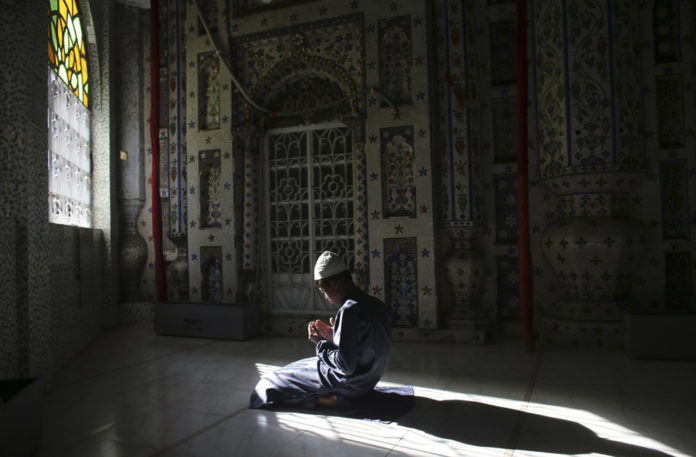Nowhere in the works of ibn Taymiyyah has he used the word jihha in describing Allah. Rather the basis of this accusation arises from his following our Salaf and clearly stating that Allah is outside of His creation, above the heavens, over His Throne. When reading this, the misguided philosophers (mutakallimeen) argued that this position of ibn Taymiyyah necessitated that Allah have a direction.
The Position of the Salaf as to Allah being distinct from creation
Know that the verses of the Qur`aan on this issue, clear and unequivocal in their meaning, run into hundreds, and likewise the ahaadeeth, that Allah is above His creation and over His Throne. These are well known so we will suffice here with stating the position of the Salaf on this issue as it is they who understood the Qur`aan and Sunnah the best.
Below is a translation of some points from ‘Khalq Af`aal al-Ebaad’ of Imaam Bukhari (RH), pp.13+. All narrations quoted are authentic insha`Allah according to the takhreej done of the works quoted. The narrators are mainly Taabi`ee and those that came immediately after.
“6) Wahb bin Jareer said, The Jahmiyyah are heretics, they think that He has not risen over His Throne.
13) Ibn al-Mubaarak said, we do not say as the Jahmiyyah say that Allah is on the earth, rather He has risen over His Throne.
14) And it was said to him, how should we know our Lord? He said, above the Heavens, over/upon (`alaa) His Throne
29) Sufyaan ath-Thawree was asked about the verse, “and He is with you wheresoever you are”. He said, His Knowledge.
64) Sadqa said, I heard Sulaiman at-Taimi saying, if I were asked, “where is Allah?” I would say, “above (fee) the heaven”. And if it said, “where was the Throne before the Heaven?” I would say, “over the water.” And if it is said, “where was the Throne before the water?” I would say, “I do not know.”
And Imaam Bukhari said, and that (i.e. his answer) was because of the saying of Allah, “and they cannot encompass anything of His Knowledge except what He wills.” i.e. except what He explains.
[This shows that the question where is Allah was considered allowed by the Salaf, and how could it be otherwise when the Prophet ﷺ himself asked the slave girl, “where is Allah” as is established firmly in the saheeh of Imaam Muslim. So do not be misguided by the neo-Jahmiyyah of today, Saqqaaf and al-Habbashee and their likes who try to declare the above hadeeth of Muslim as weak, and make out that the above question is a bid`ah, having only the classical Jahmiyyah as their precedents.]
66) Muhammad bin Yusuf said (one of the teachers of Bukhari), the one who says that Allah is not over (`alaa) His Throne is a kaafir. And the one who thinks that Allah did not speak to Moses is a kaafir.
103) Ibn Mas`ud (RA) said about His saying, “then He rose over His Throne”, – the Throne is over the water, Allah is above (fawqa) the Throne and He knows what you are upon.
104) Qataada said about His saying, “and He is Allah in the Heaven and in the Earth” – the One Who is worshipped in the heaven and in the earth.”
Below are further points translated from Sharh Usul I`tiqaad Ahlus Sunnah of al-Laalikaa`ee (d.414, pp396+)
“660) Abdullaah bin Abbaas (RA) said, Verily Allah was above His Throne before He created anything, then He created the creation and decreed what was to exist until the Day of Judgement.
662) Bashr bin Umar said, I heard more then one of the Mufassir say about the verse, “The Most Merciful istawaa upon the Throne” – istawaa means rose above.
665) Rabee`(one of the teachers of Maalik) was asked about the verse, “The Most Merciful rose over His Throne” – how did He rise? He replied, al-Istawaa (rising) is known, and the how is not comprehensible, and from Allah is the message, and upon the Messenger is the preaching, and upon us is believing.
670) Maqaatil bin Hayaan said about His saying, “and there is no secret discourse of 3 people except He is the fourth, or of 5 people and He is the sixth” – He is above His Throne, and nothing is hidden from His knowledge.
673) Imaam Ahmad was asked, Allah is above the seventh heaven, above His Throne, distinct from his creation, and His Power and Knowledge are in every place? He replied, yes, above the Throne and His Knowledge is in every place.
675) Imaam Ahmad was asked about the verse, “and He is with you wheresoever you are”, and the verse, “there is no secret discourse of 3 people except that he is the fourth.” – he replied, (meaning) His Knowledge, He is the Knower of the seen and the unseen, His knowledge encompasses everything, and our Lord is above the Throne without setting limits and giving description, and His Kursi is as the expanse of the heavens and the earth with His Knowledge.”
Imaam Awzaa`ee said, “we used to say, while the Taabi`een were many, indeed Allah is above His Throne, and we believe in what occurs in the Sunnah to do with His Attributes” [ Related by al-Bayhaqi in Asmaa was Sifaat (pg. 408) and ibn Hajr declared its chain of narration to be good as in Fath al-Baaree (13/406).]
Imaam Abdullaah bin Ahmad quoted Abdullaah ibn Mubaarak as saying, …I bear witness that You are above Your Throne above the seven heavens and this is not as the enemies of Allah say, the heretics. [ Sharh as-Sunnah of Imaam Abdullaah]
He also quoted Abdullaah ibn Mubaarak as saying, we know that our Lord is above the seven heavens over the Throne, and we do not say as the Jahmiyyah say that he is here, pointing with his hand to the earth. [Ibid.]
Abu Haneefah (RH) said, when asked of his opinion of the one who says, I do not know whether Allah is in the heavens or on the earth. –
He has disbelieved, because Allah says, “The Most Merciful rose above the Throne.”, and His Throne is above His seven heavens. He was then asked, what if he said that Allah is above His Throne but he does not know whether the Throne is in the heavens or on the earth? He said, He has disbelieved, because He has denied that He is above the heavens and whosoever denied that He is above the heavens has disbelieved. [al-Uluww of adh-Dhahabee, also Sharh Aqueedah at-Tahaawiyyah of ibn Abee al-Izz al-Hanafee.]
Ibn Khuzaymah (the Imaam of the muhadditheen of his time) said, whosoever does not affirm that Allah is above His heavens, over/upon (`alaa) His Throne and He is distinct from His creation, must be forced to repent.
Imaam Abul Hasan al-Ash`aree (d.290) in al-Ibaanah brings a whole chapter on Istawaa (Allah Rising over His Throne), in the course of his discussion he said, and some people say, from the Mu`tazila and Jahmiyyah and Hururiyya, about the saying of Allah, “The Most Merciful rose upon His Throne”, that he istawla (conquered), Milak (owned), Qahr (dominated), and that Allah is in every place, and they denied Allah being above His Throne, as the People of Truth say…
[al-Ibaanah (pg. 120+) containing an excellent refutation of the above claim. This also refutes clearly what Abu Mansur al-Baghdaadee states in his Farq bayna al-Firaq that, “The majority go the way of saying that the meaning of “Istawaa” is establishing dominance (al-qahr) and victory (al ghalaba), that is, the Merciful vanquished the Throne (al-rahmanu ghalaba al-`arsh) and overcame it (wa qaharahu). He mentioned the Throne specifically because it is the greatest of created things (a`dhamu al-makhluqat).”
It should be said to him, establish the throne and then sit on it, what majority? When the totality of the Salaf held that Istawaa meant that Allah has risen over His Throne. Not only that but the very Imaam that Abu Mansur claims to follow, al-Ash`aree refutes his very claim as being misguidance!]
The quotes on this run into the hundreds from the salaf, and the books written on this by the early scholars of Islaam are many but we do not wish to lengthen the discussion beyond what is necessary.
So we say to those that accuse ibn Taymiyyah of giving Allah a direction, because of this belief of his: Your accusation necessitates that all of the above Salaf also held Allah to have a jihha, including the two great Companions, ibn Mas`ud and ibn Abbaas. So if you were to declare ibn Taymiyyah as misguided due to this, then you must do the same with the Salaf. We seek refuge with Allah from such misguidance!
Ibn Taymiyyah said,
| “And when it became established in the souls of the addressees (of the revelation) that Allah is the Highest of the High, and the He is Above everything, the understanding of His saying, “Indeed He is (fee) the Heaven” became that He was High and Above everything. Likewise the slave girl when it was said to her, “where is Allah,” she said, “(fee) the Heaven,” meaning above, without designating for Him a created body or His being contained in His Creation .Furthermore whosoever thinks that Allah being (fee) the Heaven means that the Heaven surrounds or encloses Him, then he is a liar if he is quoting someone else or misguided if He believes this with respect to His Lord. We have not heard anyone understand this from this word (fee) just as we have not seen anyone quote this from anyone else” [Bayaan Talbees al-Jahmiyyah (1/559) of ibn Taymiyyah] |
He said in Darr at-Ta`aarud (1/253),
| “so when the Creator, the Exalted is separate and distinct from the creation, high above it, and there is nothing in existence save the Creator and created, then there is nothing that exists alongside Him which is besides Him, let alone that He – Subhaanahu – should be in some existing thing which surrounds and encompasses Him.” |
Ibn Taymiyyah said,
| “The people fall into three groups over the convention of the use of the word jihha. A group that negates it, another that affirms it, and a third that explains the issue. This difference is present amongst the followers of the Four Imaams who affirmed the Attributes of Allah and the difference of the Ahlul Hadeeth and Sunnah, specifically, over this is a difference in wording, not in meaning. This is why a group from the Companions of Ahmad – like the Tameemiyyeen and al-Qaadee in one of his two sayings – negated it yet another, larger group, affirmed it – and this is the last saying of al-Qaadee. This is because the word jihha could be used to refer to that which is subject to time and space (wujood) or that which is not (ma`doom) and it is known that there is nothing present except for the Creator and creation.
So if the word jihha is used to refer to something that exists other than Allah then it refers to something created by Allah and Allah is not encompassed or confined by any of his creation. If the word is used to refer to something outside time and space, i.e. above the creation, then there is nothing there except Allah.” [Minhaaj as-Sunnah (1/216) of ibn Taymiyyah.] |
So it is clear with all of this that ibn Taymiyyah did not believe Allah to be subject to any of the created direction, nor did he believe Allah to be surrounded in any way by His creation






















